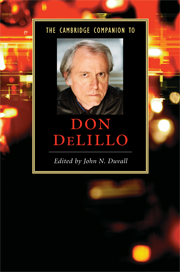Book contents
- Frontmatter
- Introduction: The power of history and the persistence of mystery
- PART I AESTHETIC AND CULTURAL INFLUENCES
- PART II EARLY FICTION
- PART III MAJOR NOVELS
- PART IV THEMES AND ISSUES
- Conclusion: Writing amid the ruins: 9/11 and Cosmopolis
- Select bibliography
- Guide to further reading
- Index
- Series List
Conclusion: Writing amid the ruins: 9/11 and Cosmopolis
Published online by Cambridge University Press: 28 June 2008
- Frontmatter
- Introduction: The power of history and the persistence of mystery
- PART I AESTHETIC AND CULTURAL INFLUENCES
- PART II EARLY FICTION
- PART III MAJOR NOVELS
- PART IV THEMES AND ISSUES
- Conclusion: Writing amid the ruins: 9/11 and Cosmopolis
- Select bibliography
- Guide to further reading
- Index
- Series List
Summary
The fall of the Towers
Many lives came to an abrupt end on the morning of September 11, 2001, among them those of a financial analyst with Cantor Fitzgerald in the World Trade Center who did not return to meet his wife at a suburban New Jersey commuter train station; a busboy in the Windows on the World restaurant with a second job lined up that evening in the Bronx; and a firefighter from Queens who had expected a day of camaraderie at the fire station. The 1990s had been marked by the technological acceleration and financial excesses of the information economy; but the freeze-frame shot of American Airlines Flight 11 penetrating the glass and steel carapace of the North Tower at 8:46 am brought this symbol of the United States's preeminent place in multinational capitalism to ruins. Don DeLillo, who had nearly finished drafting his thirteenth novel, Cosmopolis (2003) at the time, shared in the collective seizure of the American mind. “Terror,” he observes, “is now the world narrative, unquestionably. When those two buildings were struck, and when they collapsed, it was, in effect, an extraordinary blow to consciousness, and it changed everything.” After the terrorist attacks, DeLillo claims, “I took a long pause. I just didn't want to work for a while, although I wrote an essay on the attacks themselves. The attacks didn't affect the novel directly, but they certainly affected me.”
- Type
- Chapter
- Information
- The Cambridge Companion to Don DeLillo , pp. 179 - 192Publisher: Cambridge University PressPrint publication year: 2008
- 7
- Cited by

